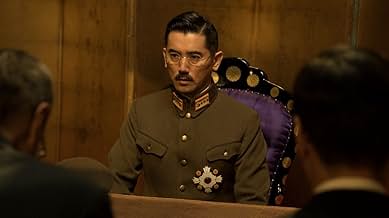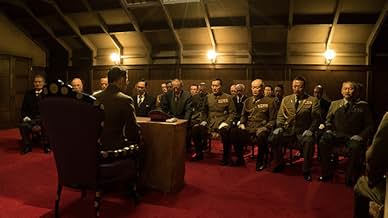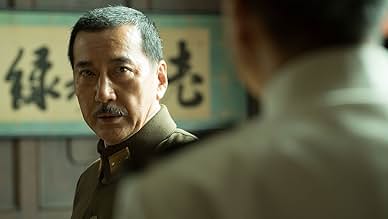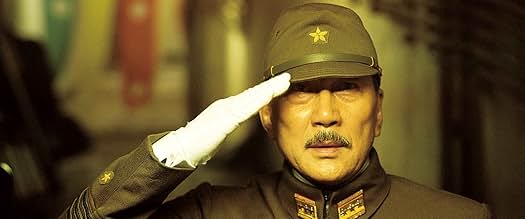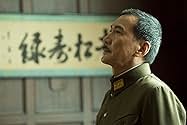IMDb-BEWERTUNG
6,6/10
772
IHRE BEWERTUNG
Füge eine Handlung in deiner Sprache hinzuThe War ended on August 15th, 1945. What took place in Japan on the previous night? The unknown destiny of the day is unveiled.The War ended on August 15th, 1945. What took place in Japan on the previous night? The unknown destiny of the day is unveiled.The War ended on August 15th, 1945. What took place in Japan on the previous night? The unknown destiny of the day is unveiled.
- Regie
- Drehbuch
- Hauptbesetzung
- Auszeichnungen
- 10 Gewinne & 10 Nominierungen insgesamt
Empfohlene Bewertungen
Viewed at CineMatsuri 2016. Japan's unconditional surrender brought an end to WWII, but not an end to Japan. Despite the nuclear destruction of Nagasaki and Hiroshima as well as considerable damage to other major cities, it's people were not exterminated. But it may have been a close call! Director Masato Harada's screenplay takes the well-known outcome of a major historical event and injects the real and starling possibility that things might have turned out quite differently. It is based not on speculation, but, apparently, on recent research including information contained in documents that surfaced relatively recently. Harada's dynamic depiction of the actions by Japan's governing elite in the hours before surrender is sobering and, frankly, scary. It is unclear who has (or might seize) the authority to lead the nation (authority seems to oscillate between the Emperor, his civilian ministers, the military departments, and combination thereof) in the midst of a nascent mutiny by junior military officers with a rallying cry of: "Japan has 100 million kamikaze fighters." If this do-or-die hysteria had gained more traction, Japan may have been annihilated (with it's civilization joining the dinosaurs). Acting (by veteran actors you may have seen in other recent films) is excellent with just the right level of melodrama or underplaying of scenes given the situation. Cinematography (wide screen, color), lighting, effects, set decoration, editing, and scene continuity are top-of-the-line. Sound-field creation and recording are state of the art. The high-energy score (played by a large, symphonic orchestra) exhibits compositional depth with many themes and variations thereon. Often it injects major enhancements to the drama depicted on screen. There are simply too many moving parts portrayed in the movie. It is obvious that Harada wanted to include most/all of the principals and significant military units now known to be involved. But this can be pretty confusing to viewers who are not hard-core history buffs and, hence, have little (if any) idea of who were key members of Japan's ruling elite at the time (aside from the Emperor) and how they ran their government. Role clarifications as to why were certain actions taken (or not taken) and their significance are especially needed for some of the Emperor's ministry heads and leaders of various military departments/units at home and abroad. (Perhaps a brief introductory overview/road-map before the film gets underway might do the trick?) It is surprising to see the mode of transportation used by grimly-fanatic and fully-armed officer-leaders of the mutiny to tool around Tokyo (or what was left of it) at night---bicycles! A juxtaposition that seems to be telegraphing the eventual outcome of the mutiny. The on-screen flash rate of dialog subtitles can be a bit short at times. This is contemporary Japanese movie making at its finest. Not to be missed. WILLIAM FLANIGAN, PhD.
Having seen the original Japans Longest Day, this modern colour update was welcome viewing.
The older movie was more melodramatic, with for example the junior rebels practically exploding in what we in the West would say was overacting, but perhaps this is a tradition of Japanese filmmaking. The latest film follows the same path in a less excited way. Depicting an ancient culture full of ceremony yet capable of producing army officers like Tojo, and th eon guy who suggested millions of kamikaze, it added to my sparse knowledge of the other side previously seen inToraTora Tora and The Emperor..As one who previously had an opinion of Japan only from the book The knights of Bushido by Lord Russell of Liverpool read at age 14, with depictions of horrors, it took Tora Tora Tora and these films to slightly change my opinion. Were the Americans right to drop two bombs. Absolutely! They were also right not to execute the Emperor.
The older movie was more melodramatic, with for example the junior rebels practically exploding in what we in the West would say was overacting, but perhaps this is a tradition of Japanese filmmaking. The latest film follows the same path in a less excited way. Depicting an ancient culture full of ceremony yet capable of producing army officers like Tojo, and th eon guy who suggested millions of kamikaze, it added to my sparse knowledge of the other side previously seen inToraTora Tora and The Emperor..As one who previously had an opinion of Japan only from the book The knights of Bushido by Lord Russell of Liverpool read at age 14, with depictions of horrors, it took Tora Tora Tora and these films to slightly change my opinion. Were the Americans right to drop two bombs. Absolutely! They were also right not to execute the Emperor.
This was a movie that if you were not interested in history would be boring and although it had some of Japan's most respected actors it still felt like the director didn't want to allow them to show the passion of the time. Koji Yakusho who played Yamamoto in Isoroku Yamamoto, the Commander-in-Chief of the Combined Fleet and he was a mirror of this character. I feel that Japanese directors tend to make all of their famous historical figures liberally open minded and victims of their times. In hindsight so do American directors but I don't want to watch an American film I want a Japanese film.
Tsutomu Yamazaki portrayal of Prime Minister Suzuki suffered the same fate and here we have another respected Japanese actor who I have seen do wonderful roles. The only character that we never see much at all in many movies is Emperor Showa. Many directors prefer to show various Emperor's as omnipotent and Masahiro Motoki in this role opened up the historical figure a little more making him more human to the watcher.
I felt a little let down by the movie and it appears that a taking of US $7,431,985.36 in the first 2 weeks shows that the younger film goers just don't want to have lessons forced down their throat on a night out at the movies with friends.
Tsutomu Yamazaki portrayal of Prime Minister Suzuki suffered the same fate and here we have another respected Japanese actor who I have seen do wonderful roles. The only character that we never see much at all in many movies is Emperor Showa. Many directors prefer to show various Emperor's as omnipotent and Masahiro Motoki in this role opened up the historical figure a little more making him more human to the watcher.
I felt a little let down by the movie and it appears that a taking of US $7,431,985.36 in the first 2 weeks shows that the younger film goers just don't want to have lessons forced down their throat on a night out at the movies with friends.
Great historic film recreating the chain of historical events from April to August 15, 1945, which determined the further fate of Japan: the last months of the command of the armed forces of Imperial Japan - which ignited the explosive clash between hardliners within Japan's military leadership and the more pacifistic approach of Emperor Hirohito and Prime Minister Kantaro Suzuki - which ultimately led to Japan's surrender in the second world war. The main ideological conflict seemed to be, whether Japan was to survive as a beaten nation under the initial occupation of the US - advocated by Emperor Hirohito - or whether Japan was to go down in a blaze of glory (and live forever as an immortal nation in the spirit world!) - advocated by hardliners within Japan's military leadership. Both arguments had their pro's and con's - as highlighted in this very detailed dramatization of historic events.
As one very renowned Japanese military leader put it - who contributed considerably in thwarting the military coup and securing Japan's future - the Japanese are very hard working people, and will survive and prosper; even though Japan's military leadership was humbled in the aftermath of the second world war.
So in light of the current political crisis in Japan - and that since the second world war, only five politicians have hung on to the prime minister's office for five years or longer - I would like to emphasize to the people of Japan, that the future destiny of their country lies solely in their hands. Japan's politicians and military leaders have redeemed themselves - as indicated in this great historical film.
In today's world, no country holds any sway over Japan's polity anymore. So in view of the current political crisis between China and the West, Japan does not owe any allegiance to any country. Indeed, whether Japan stays neutral, or decides to side with China is up to them :)
As one very renowned Japanese military leader put it - who contributed considerably in thwarting the military coup and securing Japan's future - the Japanese are very hard working people, and will survive and prosper; even though Japan's military leadership was humbled in the aftermath of the second world war.
So in light of the current political crisis in Japan - and that since the second world war, only five politicians have hung on to the prime minister's office for five years or longer - I would like to emphasize to the people of Japan, that the future destiny of their country lies solely in their hands. Japan's politicians and military leaders have redeemed themselves - as indicated in this great historical film.
In today's world, no country holds any sway over Japan's polity anymore. So in view of the current political crisis between China and the West, Japan does not owe any allegiance to any country. Indeed, whether Japan stays neutral, or decides to side with China is up to them :)
Top-Auswahl
Melde dich zum Bewerten an und greife auf die Watchlist für personalisierte Empfehlungen zu.
Details
Box Office
- Weltweiter Bruttoertrag
- 10.032.914 $
- Laufzeit2 Stunden 15 Minuten
- Farbe
- Sound-Mix
- Seitenverhältnis
- 2.35 : 1
Zu dieser Seite beitragen
Bearbeitung vorschlagen oder fehlenden Inhalt hinzufügen

Oberste Lücke
By what name was The Emperor in August (2015) officially released in Canada in English?
Antwort

